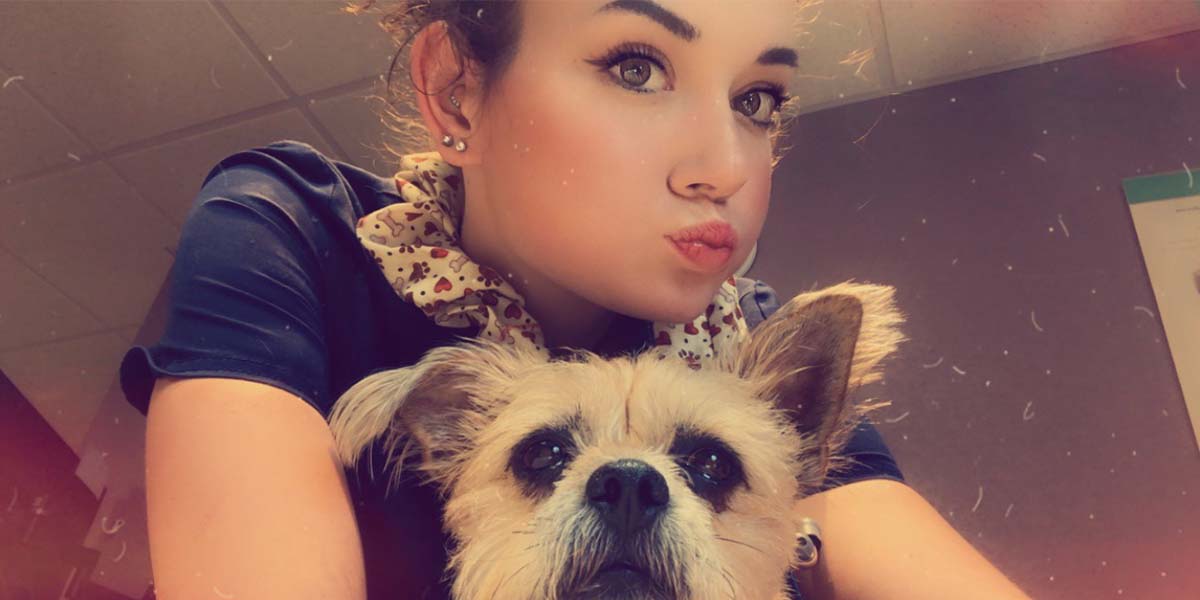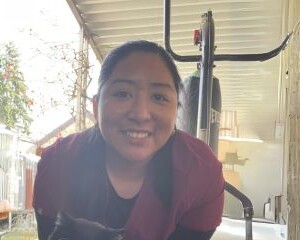Making Progress Towards Her Future Goals, Veterinary Assisting Graduate Works with Exotic Animals

Milayna Jungert is going places and nobody can stop her. While a senior in high school, the now 19-year-old graduate from Carrington College Spokane’s Veterinary Assisting (VA) program was accepted into the University of Georgia to study zoology with numerous scholarships. That had been her dream since childhood but decision-making outside her control prevented her from seizing the opportunity. She was deeply disappointed but undeterred. Milayna recalibrated and set her sights closer to home in the Pacific Northwest at Carrington’s VA program in Spokane, Washington. She knew she would eventually go to UGA to become a zoologist studying exotic animals someday and she wanted to make progress towards accomplishing her goals. Veterinary assisting would be a great entry-point for her to follow her passions while launching her career.
“I don’t want to limit myself. I want to keep challenging myself every day. I love learning,” she said.
When the term “exotic” is used in the veterinary world, it generally refers to animals that are not cats, dogs, horses, cows, pigs, goats, or sheep. This means that if a good samaritan calls 911 about a bald eagle with a verifiably broken wing on the side of a highway, the US Fish and Wildlife Department would need a veterinary team experienced with exotics—in particular, avians. Exotics likewise include common small pets like French Lop rabbits and bearded dragons. They also include animals from our native forests and plains like deer, foxes, wolves, bison, and raccoons. Then, of course, we have the animals that typically come to mind first when we hear the word exotic. These might include the Siberian lynx, capybaras, wallaby, fennec fox, serval, ball python, or chimpanzee—to name just a few. These animals might live on private land or in public facilities.
Many veterinary practices don’t treat exotics and so it is a specialized area. It is also more common in certain regions, depending on the climate, culture, and state laws that govern animal ownership. Fortunately for Milayna, her professor at Carrington’s Spokane campus, Pamela Payne, had many years of experience with exotics when she first heard her ambitious new student say that she intended to work with them. Pamm was excited about Milayna’s shared passion but also a bit concerned because her experience had taught her that Washington wasn’t the best state for specializing in exotics. She cautioned her student and told her the truth about the local market.
Pamm was delighted by Milayna’s response, “Luckily, she responded the way I hoped she would. She told me that this was a stepping stone to where she wants to be.”
Milayna quickly proved herself to be many things, including “out-going, easy-going, clever, confident, friendly, independent, funny, generous, patient, hard-working, honest, kind, polite, serious, and smart,” according to Pamm. She said that Milanya possessed a combination of all the best qualities that are usually spread across multiple students. What was even better was Pamm saw her using those qualities to not just help herself but to also help her classmates.
She said, “Milayna was so impressive that I placed her as a team lead in her second term. I knew, or I hoped she would excel as a leader and she did. The students that were on her team would always say that they learned so much from her because of the amount of detail she put into everything she did. She was very patient with the new students as well as becoming the student people would turn to if they needed help with anything. They knew she had researched the subject and could tell them anything they had questions about.”
Pamm said that Milayna was so passionate about the subject matter that she would pay her family members to bring her dog Brutus to campus so she could use him as a living example. That way every student on her team got hands-on experience with an animal. Milayna consumes and retains as much information as she can about animals. They have been her favorite subject since she was five-years-old, which is the same age she knew she wanted to dedicate her life to working with them. And as she gains more experience and grows older, she intends on possessing an impressive, encyclopedic wealth of knowledge akin to great zoologists like Jane Goodall, David Attenborough, or the late Steve Irwin. “I want to have the kind of knowledge that makes people go ‘wow!'” she said.
When it came time for Milayna’s class to do their externships, Pamm was able to connect her with an opportunity at VCA North Idaho Animal Hospital in Sandpoint, Idaho. The drive would be longer than most students would like but it would also give her the opportunity to work with exotics, especially wildlife. The one challenge was she would need a car for the journey. Throughout the program, she was dropped off at school in the wee hours of the morning when it was still cold and dark outside. That helped with getting to the classroom in Spokane but it wouldn’t get her to Sandpoint, which is more than seventy-two miles away. Thankfully, one of her family members was so impressed by her 4.0 GPA and the exceptional work that she had done at Carrington that they stepped forward to help with her transportation. She would have a safe, warm car to help her complete the next phase of fulfilling her journey.
During her externship at VCA, Milayna gained experience with both domestic and exotic animals, including wildlife as she hoped. She had opportunities to learn from creatures like snakes, turtles, foxes, owls, coyotes, fawns, eagles, and hawks. It wasn’t uncommon for animals in the wild to be injured in coyote and bear traps or poisoned by substances found in rodents or marine life.
She found each patient that came to the clinic fascinating and said, “It is a true honor to work with any kind of species of animal.”
It was clear that the team at VCA was impressed by Milayna’s knowledge and passion for their patients because they had already decided by her second week that they wanted to give her a permanent position. Pamm said, “During week two of extern, I called to set up her mid-point eval. When talking to the manager, she expressed how impressed she was with Milayna and how they planned on hiring her as soon as the extern was over. We scheduled the midpoint eval for the next week. While I was there, I had the opportunity to watch Milayna work alongside the employees and veterinarians. Every person I encountered expressed how phenomenal she was.”
As Milayna’s externship came to an end, they offered her the permanent position and she immediately took it. Since graduating from Carrington earlier this year and continuing to work at VCA, she has become certified as a surgery assistant and passed their on-site pharmacy credentialing. Her employer is even paying for her to start an online Veterinary Technician (VT) program that she can do from Idaho in December. She intends on staying in Idaho at VCA until 2022 when she transfers to another VCA clinic in Georgia as a VT and starts at UGA where her admission and scholarships still await her. By then, she will have saved up from working for a few years and hopes to have enough for a down payment on a house near Athens. She is still just as serious about becoming a zoologist now as she was when she graduated from high school, if not more so.
For Milayna, working with animals is as natural as a bald eagle with its freshly healed wing re to flight and soaring above us in the sky. “A lot of people don’t understand why I am so dedicated and determined. I wasn’t able to truly be myself until I was 18. Now it is my time to be myself!”
Learn More About A Career In Veterinary Assisting
If you want to learn more about how to become a vet assistant, why you should, and where to learn the skills you’ll need, read our guide on Veterinary Assisting.


